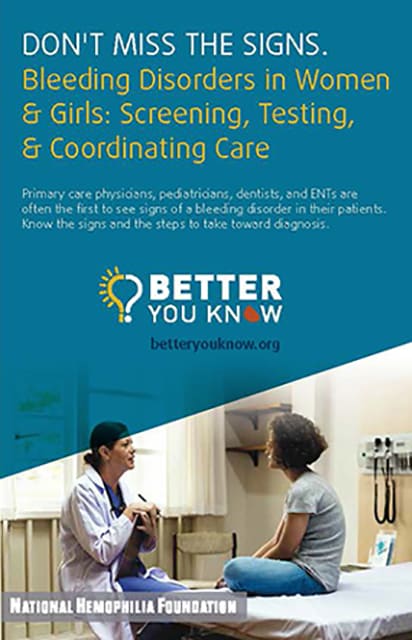Better You Know Campaign Materials
Better You Know is a campaign to raise awareness of bleeding disorders for those individuals who may experience symptoms but have not yet been diagnosed. To learn more about bleeding disorders that affect women and girls, go to the Better You Know website, developed by the National Hemophilia Foundation in partnership with the Centers for Disease Control and Prevention.

If you have one or more of the signs and symptoms of a bleeding disorder, please talk with your doctor, OB/GYN, or other healthcare professional. You can also take an online bleeding disorder risk assessment to determine if you may be at risk for a bleeding disorder. Bleeding disorders can be dangerous if not treated. Finding out if you may be at risk can be the first step to feeling better.
If you decide to seek care, the Better You Know website also provides tools, information, and resources that can simplify your next steps.
Bleeding disorders can be treated, but first you need to know if you have one.
Free Materials about Signs and Symptoms
Use these postcards, booklets, and questionnaires to increase awareness of the signs and symptoms of a bleeding disorder and find out if you may have one.
Free Materials When Seeking Care
Use these questionnaires and booklets to help you communicate with your healthcare provider, and understand lab testing you might receive if you get referred to a hematologist (doctor who specializes in diagnosis and treatment of blood disorders) for diagnosis.
Watch as 10 women share their experiences living with the symptoms of a bleeding disorder, their journeys between the onset of their symptoms to diagnosis, and the empowerment gained from knowing their diagnosis.
Information for Healthcare Providers
Find brochures and training opportunities to help non-hematology healthcare providers learn to better assess bleeding symptoms in women and girls.
The Better You Know campaign for women and girls was developed by the National Hemophilia Foundation and the Centers for Disease Control and Prevention under Cooperative Agreement NU27DD001154

